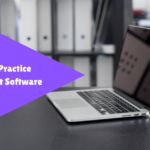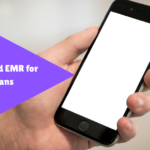Managing a child’s health requires continuous monitoring, timely vaccinations, and regular check-ups. Traditional paper records can be difficult to maintain, prone to loss, and inefficient in emergencies. That’s where child health record software comes in — a digital tool designed to streamline, secure, and simplify pediatric health tracking for both parents and healthcare providers.
In this guide, we’ll explore what child health record software is, its key features, benefits, and why it’s an essential tool in 2025 for every parent and pediatric clinic.
Ready to take the first step?
We’ll assist you through every step.

What is Child Health Record Software?
Child health record software is a digital platform that allows parents, doctors, and healthcare institutions to record, access, and manage a child’s medical information in real-time. It typically includes:
- Immunization history
- Growth and development milestones
- Allergies and chronic conditions
- Visit summaries and prescriptions
- Lab reports and diagnostic data
This software is often accessible via web or mobile apps and is designed with user-friendly dashboards, especially helpful for first-time parents.
Why Child Health Record Software Matters in 2025?
With increasing awareness around preventive healthcare and digital health infrastructure, the need for child health record software has surged globally. Parents no longer want to rely solely on physical vaccination cards or memory. They want accurate, real-time updates and reminders that support their child’s development.
At the same time, pediatricians and hospitals benefit from instant access to updated records that eliminate manual work and reduce the risk of human error.
Key Features of Child Health Record Software
When selecting a child health record software, here are the essential features to look for:
1. Vaccination Tracker & Scheduler
- Automatic reminders for upcoming vaccines
- Timeline view of completed immunizations
- Integration with national immunization schedules (like India’s IAP or the CDC in the USA)
2. Growth Monitoring
- Charts for height, weight, BMI, and head circumference
- Comparative analytics to national health standards
- Alerts for abnormal growth patterns
3. Digital Health Summary
- Centralized records for doctor visits, prescriptions, and treatments
- History of allergies, ongoing conditions, and surgeries
4. Lab & Diagnostic Reports
- Upload and view lab results from partnered clinics
- Downloadable health PDFs for use in school or travel
5. Data Privacy & Accessibility
- Secure logins with encryption
- Role-based access for parents, doctors, and specialists
- Cloud backups to prevent data loss
Benefits of Using Child Health Record Software
The implementation of child health record software offers numerous advantages for all stakeholders in a child’s health journey:
1. For Parents
- Peace of mind: Access all medical records from one dashboard
- Timely alerts: Never miss a vaccine or check-up
- Better decision-making: Data helps parents understand their child’s growth
2. For Pediatricians
- Faster consultations: Pre-filled records save time
- Improved accuracy: No risk of missing vital history
- Patient engagement: Enables proactive care based on trends
3. For Schools & Government Programs
- Easy verification of vaccination records
- Support for public health surveillance and campaigns
Who Should Use Child Health Record Software?
This software is ideal for:
- New parents tracking their baby’s health journey
- Pediatric clinics and doctors managing multiple patients
- Hospitals and maternity homes offering child health packages
- Public health departments are implementing vaccination drives
- School administrators verifying health compliance
In short, anyone involved in a child’s care and development can benefit from this solution.
Child Health Record Software Adoption Trends in 2025
As digital healthcare adoption accelerates globally, here are the top trends seen in child health record platforms:
1. Mobile-First Design
Apps are optimized for smartphones, making it easy for parents to track vaccinations and consult with pediatricians.
2. Integration with EHRs
Child health record software now integrates with Electronic Health Records (EHRs) for seamless clinic-to-clinic transfer.
3. AI-Driven Alerts
Some advanced systems analyze patterns and alert doctors about possible deficiencies or developmental delays.
4. Multilingual Support
To ensure inclusivity, many platforms now offer support in regional languages, especially in multilingual countries like India.
Real-Life Example
Riya, a new mother in Delhi, uses a mobile-based child health record software linked with her pediatrician’s clinic. When her baby turns 6 weeks old, she receives a reminder about the DTP vaccination. At the clinic, the doctor updates the software after administering the vaccine, and Riya instantly receives the updated record via SMS.
This simple yet powerful system ensures Riya never misses a vaccine and can pull up her child’s complete medical history during emergencies or travel.
How to Choose the Right Child Health Record Software?
Here are a few tips for selecting the right tool:
- Check for local compliance (e.g., IAP, WHO schedules)
- Look for mobile + desktop accessibility
- Ensure robust data security standards
- Read reviews from other parents and doctors
- Prefer software that integrates with hospitals or clinics nearby
Conclusion
In 2025, child health record software is no longer optional—it’s an essential companion in parenting and pediatric care. With smart features like vaccination tracking, growth monitoring, and real-time reminders, these digital tools help reduce medical errors, ensure timely care, and empower parents with the information they need.
For healthcare providers, it offers a seamless way to manage records, communicate with families, and improve the overall quality of care. Whether you’re a parent of a newborn or a doctor managing hundreds of young patients, adopting a reliable child health record software will transform how you manage child wellness in the digital age.
Kiddoklinik is a clinic health record software that makes the work of doctors easier. Contact us today for more information about the software!
FAQs
Q 1: What is child health record software?
Answer:
Child health record software is a digital tool designed to help parents and healthcare providers securely track a child’s medical history, including vaccinations, growth, prescriptions, and doctor visits. It streamlines pediatric care and ensures timely interventions.
Q 2: Is child health record software safe and secure?
Answer:
Yes, modern child health record software platforms use strong encryption, secure cloud storage, and user authentication to protect sensitive health information. Many comply with healthcare regulations like HIPAA for added data security.
Q 3: Can I access child health record software on my phone?
Answer:
Absolutely. Most child health record software solutions offer mobile apps for Android and iOS, allowing parents to view and update health records, receive vaccination reminders, and share reports with doctors anytime, anywhere.



